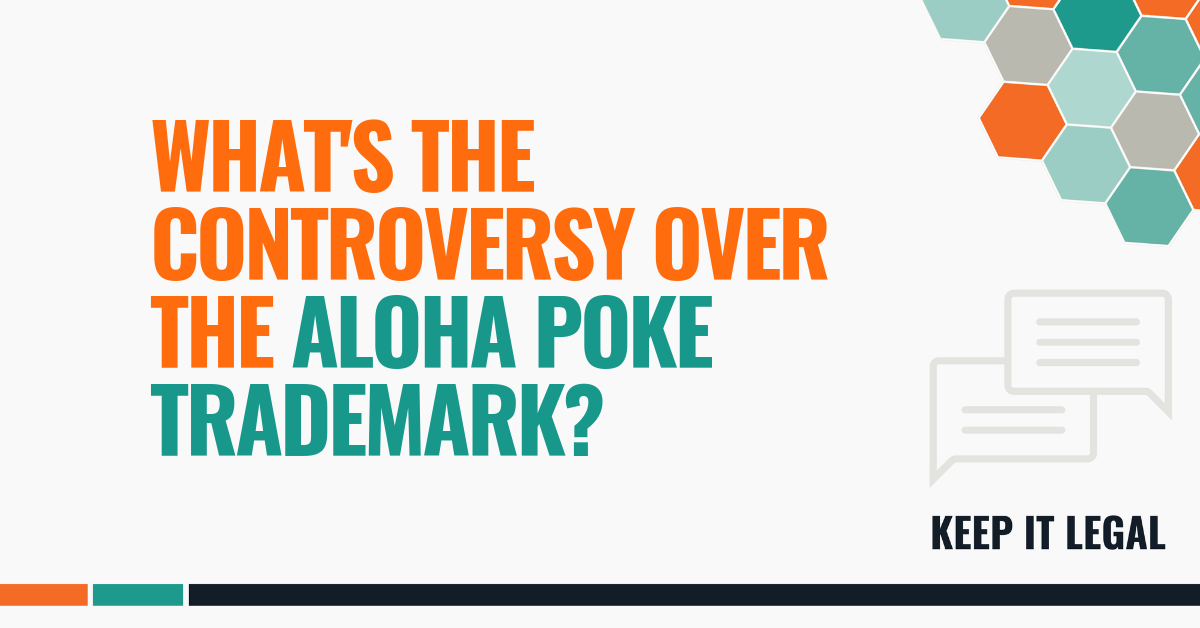A Chicago-based restaurant chain serving poke, a Hawaiian dish of raw fish and rice, recently faced a branding controversy over its ALOHA POKE® trademark. Since obtaining the trademark in 2016, the owners of Aloha Poke Co. sent a cease and desist letter—a legal notice directing another party to cease an activity—to several businesses with similar names nationwide. Several of them happened to be native Hawaiian-owned companies. Aloha Poke Co. sought to stop others from using the specific phrase ALOHA POKE for business purposes, citing trademark infringement. However, the situation boiled over in 2018 with activists and a Hawaii state representative calling for a boycott.
How Is a Trademark Defined?
As I’ve touched on before, a trademark is a symbol, word, phrase, or design that is used in commerce to identify your company as the source of goods or services. You can acquire a common law trademark simply by using a mark in commerce to identify your business offerings, or you can choose to apply for a federal trademark registration with the U.S. Patent and Trademark Office (USPTO). While a trademark can help protect your intellectual property and ensure that consumers don’t confuse you with other companies, the case of the ALOHA POKE trademark underscores the need to choose and enforce trademarks thoughtfully.
The Controversy
After its cease and desist letters to Hawaiian companies using the phrase ALOHA POKE sparked controversy, the company issued a statement responding to the backlash. The owners of Aloha Poke Co. apologized and stated that they never tried to nor planned to seek a trademark for the individual words “poke” and “aloha,” two traditional Hawaiian words. The company maintains, however, that it owns the rights to use the two words together and is only acting to protecting its brand. According to Aloha Poke Co., all businesses that received a letter complied, no legal action was taken, and no businesses closed as a result.
Yet there remains strong opposition to the company’s trademark registration, including from Kaniela Saito Ing, a Hawaii state representative, and Dr. Kalamaoka`aina Niheu, Hawaii representative for the Pacific Caucus at the United Nations. The representatives claim that the company has threatened native Hawaiians with legal action for using both the terms “aloha” and “ALOHA POKE” in relation to restaurants and associated social media marketing. Citing the impact on Hawaiian businesses and respect for the Hawaiian culture and language, Niheu created a petition lambasting the company and calling for ALOHA POKE CO. to stop using the terms “aloha,” “ALOHA POKE,” and “poke” altogether. Three months later, the petition had more than 170,000 signatures.
What Does the Aloha Poke Trademark Story Mean for You?
Yes, the company does indeed hold the ALOHA POKE trademark. The problem is, when you register a trademark with the USPTO, the office doesn’t look for uses of the trademark outside of its own database. This means that many businesses may be using the same phrase in branding and marketing, but these uses won’t show up in a trademark search if no one else has applied to register the trademark.
Compounding the problem in this case is the fact that the words in the ALOHA POKE mark are so prevalent in the Hawaiian language—with “aloha” being one of the most famous Hawaiian words since it’s used for “hello,” “goodbye,” and “love.” According to the owner of the Aloha Poke Shop in downtown Honolulu, poke is “like pizza” to Hawaiians, and the company’s cease and desist letter even asked him to stop using the word “aloha” in his restaurant name.
It’s important to understand that just because you’re able to register a trademark doesn’t mean everything is settled. The ALOHA POKE trademark might actually be open to challenge based on the concept of “prior use.” This means that if another company had already been using “Aloha Poke” in commerce as part of its name or branding prior to the trademark registration in 2016, that company may have a valid prior use claim and might be allowed to continue use. In other words, it’s one thing to obtain a trademark registration, and it’s another to enforce it against businesses that may have acquired common law trademark rights by using it in commerce long before you.
Avoid a Trademark Controversy
While a trademark is legally enforceable, it’s essential to be extremely careful in choosing and enforcing a mark. Given how intense and protracted these conflicts can be, it’s important to have a knowledgeable attorney assist you in navigating trademark law. The case of the Aloha Poke Co. is an example of a trademark registration gone wrong: the company now finds itself in a brand crisis as it tries to grow and expand.
Trademark registration and enforcement can mean the difference between success and failure, and it’s important to be strategic and forward-thinking in today’s ultra-competitive business environment. I routinely perform a U.S. Full Availability Trademark Search for my clients, which involves a search report and preparing a legal opinion letter on the results. Need help enforcing your trademark? Let’s chat.


